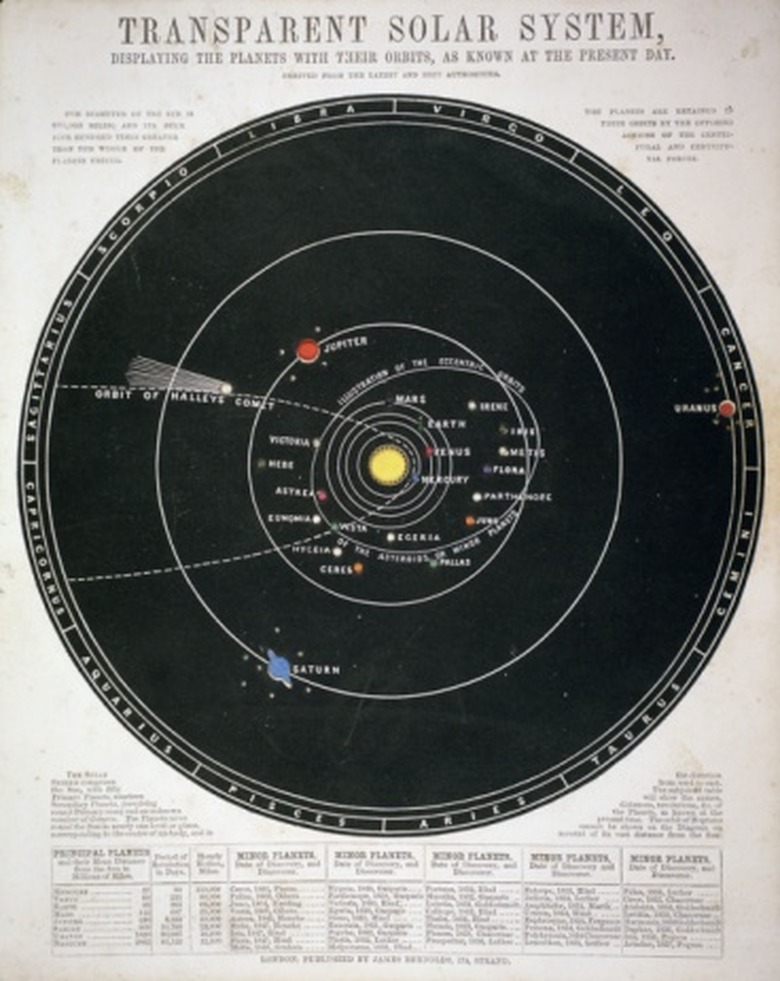What Are The Planets In Our Solar System Held In Their Fixed Revolutions?
Our solar system is located in the Orion arm of the Milky Way galaxy. It has eight planets, each of which orbit the sun at the center of the solar system. Pluto was once thought of as the ninth planet. However, discoveries lead to a change in the definition of a planet, and, according to NASA, Pluto was reclassified as a dwarf planet in 2006.
Mercury
Mercury
Of all the planets in our solar system, Mercury is closest to the sun. It takes 88 Earth days for Mercury to orbit the sun and 59 Earth days to rotate fully on its axis. The surface of Mercury is subject to intense heat from the sun, but temperatures at night drop well below freezing. According to NASA scientists, ice may be present in a few craters.
Venus
Venus
Venus is similar to Earth in size and mass, but its atmosphere is mainly composed of carbon dioxide. Venus is characterized by volcanic activity and intense heat because its dense, toxic atmosphere traps heat from the sun in a runaway greenhouse effect. Temperatures on Venus are hot enough to melt lead.
Earth
Earth
Our planet, Earth, is unique in our solar system. Earth has air, water and life, creating a constantly changing world. Earth's distance from the sun makes it ideal for life to persist because temperatures are not too hot or cold.
Mars
Mars
Mars, known as the Red Planet, is half the diameter of Earth but has the same amount of dry land. Mars, like Earth, has seasons, polar ice caps, volcanoes, canyons and weather, but its atmosphere is too thin for liquid water to persist on the surface. In 2004, six-wheeled rovers sent by NASA confirmed the presence of water ice below the surface.
Jupiter
Jupiter
Jupiter is the largest planet in our solar system. NASA's website describes Jupiter, with its dozens of moons and enormous magnetic field, as having a kind of miniature solar system. The fifth planet from the sun, Jupiter is considered a gas giant because it has no solid surface. It is mainly composed of hydrogen and helium. The planet's colorful clouds are created by jet streams and huge, intense storms, such as the Great Red Spot, which has raged for hundreds of years.
Saturn
Saturn
Saturn, the sixth planet from the sun, is the second largest in the solar system, but it is the least dense. Saturn is recognized by its ring system of ice particles, which are common to all the gas giants. Like Jupiter, Saturn has no solid surface and is mainly composed of hydrogen and helium. Saturn's largest moon, Titan, is the only moon in our solar system to have a substantiated atmosphere, according to BBC science correspondents.
Uranus
Uranus
Uranus appears to glow a blue-green color in the dim sunlight because its upper atmosphere, composed of methane, absorbs red light waves. Research by NASA scientists has led to the theory that a past collision with an Earth-sized object may be the reason why Uranus is tipped on its side with its equator nearly at right angles with its orbit.
Neptune
Neptune
Neptune is the planet farthest away from the sun, more than 30 times as far from the sun as Earth. Neptune takes 165 Earth years to orbit the sun. The surface of Neptune is covered with icy, bright blue methane clouds that speed around the planet at around 700 miles per hour. Eleven moons orbit Neptune, the largest of which is called Triton.
References
Cite This Article
MLA
Newton, John. "What Are The Planets In Our Solar System Held In Their Fixed Revolutions?" sciencing.com, https://www.sciencing.com/planets-system-held-fixed-revolutions-8506902/. 24 April 2017.
APA
Newton, John. (2017, April 24). What Are The Planets In Our Solar System Held In Their Fixed Revolutions?. sciencing.com. Retrieved from https://www.sciencing.com/planets-system-held-fixed-revolutions-8506902/
Chicago
Newton, John. What Are The Planets In Our Solar System Held In Their Fixed Revolutions? last modified August 30, 2022. https://www.sciencing.com/planets-system-held-fixed-revolutions-8506902/
